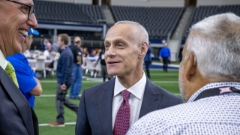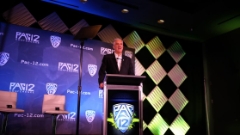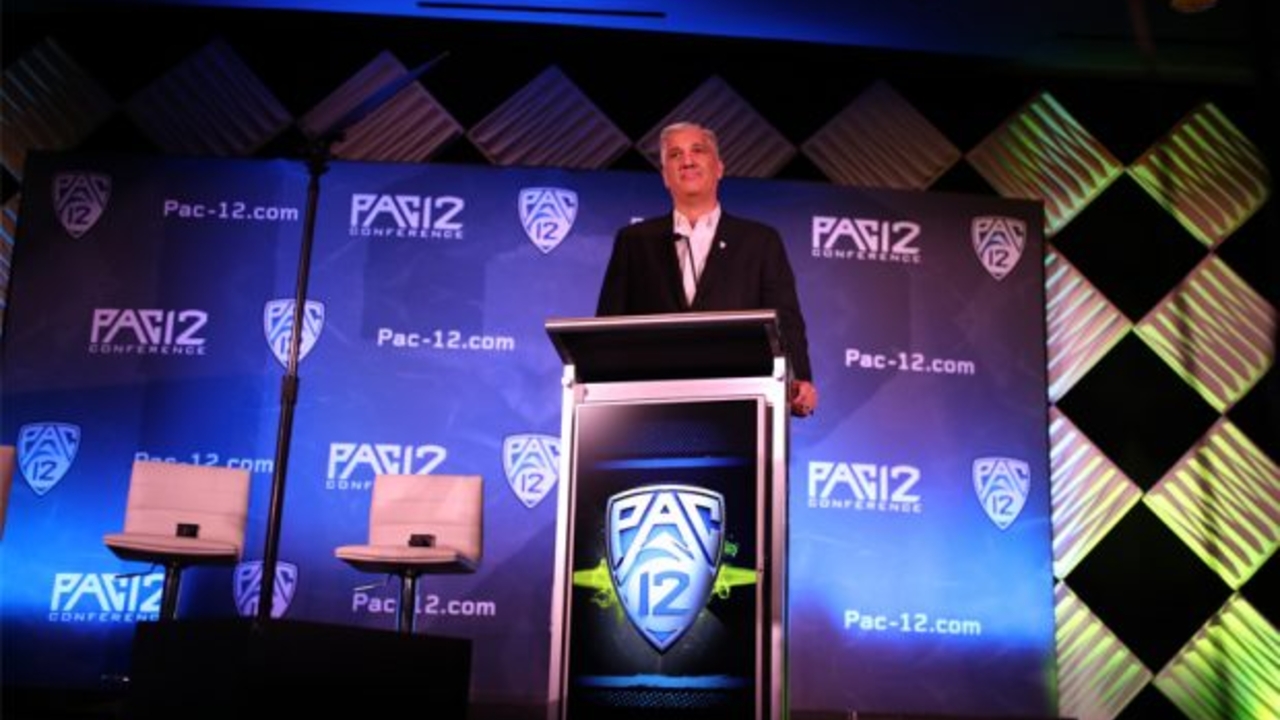STILLWATER – Earlier Friday (July 29) the Pac-12 Commissioner George Kliavkoff finally fired back. Kliavkoff has been quiet since June 30 when USC and UCLA, members of the Pac-12 Conference for nearly a century, shocked college athletics, shocked their fellow conference members, and triggered another summer of college conference realignment talk and rumors by announcing they would be moving to the Big Ten Conference by the 2024-25 academic and athletic year. So much for “The Alliance” that was supposed to prevent the Big Ten, ACC, and Pac-12 from picking off schools from each other in expansion. The Big Ten may not be through, at least their commissioner Kevin Warren hinted as much earlier this week at the Big Ten Football Media Days in Indianapolis.

Jerome Miron-USA TODAY Sports
Yormark never metioned the Pac-12, just that his conference was “open for business.”
Kliavkoff and his conference have been wounded, but he spoke boldly saying his conference and the remaining schools are dedicated and committed to making the Pac-12 a viable Power Five league and he said the upcoming details of the already started process of negotiating a new multi-media rights deal for the Pac-12 would be proof.
He was more than willing to lob some verbal incendiaries back at the Big 12. I never heard new Big 12 Commissioner Brett Yormark take any shots at the Pac-12, but Yormark’s “open for business” comment combined with media rumors on top of media rumors was enough. Kliavkoff said he has had to waste time “trying to defend against grenades being lobbed in from every corner of the Big 12 trying to destabilize our remaining conference.”

Jenny Chuang Pac-12 Conference
Kliavkoff took his own shots at the value of the Big 12 just one summer after he tried to grab a pair of those same schools.
Then Kliavkoff got down to loading up the rocket launcher.
“With respect to the Big 12 being open for business, I appreciate that,” Kliavkoff said using Yormark’s words. “We haven’t decided whether we’re going shopping there or not.”
Nice comeback with the intent of devaluing the Big 12. Truth be known, and Kliavkoff knows it. He tried to get two Big 12 schools to come join the Pac-12 last summer after the Big 12 lost Oklahoma and Texas. Most media sources listed the two schools as Oklahoma State and TCU. Some had it as Texas Tech and TCU. The truth is the two schools were Oklahoma State and Kansas State. Kliavkoff, if he wants to be honest about it, wanted those two schools because they were examples of maximizing their football programs. Kliavkoff was concerned about some of the Pac-12 membership needing a push in that regard. USC and their administration was most adamant about not wanting any football examples from the heartland. First, good idea to listen to USC on expansion or not. Second, looks like the Trojans found their own individual to spur football success from the heartland.
Kliavkoff said he understood why the Big 12 was trying to poach Pac-12 schools because …“I get it. I get why they’re scared, why they’re trying to destabilize it. I was just tired of that. That’s probably not the most collegial thing I’ve ever said.”
He preferred to move back to his schools and why he is confident the conference will stick together.
“I wanted to exude confidence in the conference, because that’s what I’m seeing from our presidents and chancellors and athletic directors,” Kliavkoff said. “It’s my job to carry that message, and I’m happy to do so.”
On another subject, name-image-and-likeness, Kliavkoff was spot on. Everybody associated with college athletics should read this and push for this process to happen and work toward it happening as soon as possible.
“I believe it is time for the 10 FBS conferences to step in and agree to NIL legislation and a strong, effective and expeditious enforcement mechanism,” Kliavkoff stated. “All 10 conferences are strongly in favor of student-athletes being able to benefit from their NIL.
“We also need three simple and obvious guardrails: NIL should not be used as an inducement. NIL should not be used as pay-for-play,” Kliavkoff continued. “And the amount earned as NIL payments should be commiserated what the NIL provided and not a veiled inducement or pay-for-play. These are current NCAA rules that the NCAA has unfortunately chosen not to enforce in the wake of the Supreme Court decision in Alston. Recodifying and enforcing these three simple NIL rules will protect our student-athletes while still allowing them to earn.
“Second, it’s time for us to consider steps we can take to fairly recognize our student-athletes’ contributions and more appropriately allocate the resources created through athletics without fundamentally changing the role of our educational institutions. While I do not believe that our student-athletes should be treated as employees, we must recognize and meaningfully address the extraordinary ways in which they contribute to our athletic programs, campuses and communities.”
He then did more than state the problem and needed guardrails. He came back with a potential solution.
“One solution might be to consider whether to expand or remove the remaining caps on academic awards,” Kliavkoff stated. “Whatever solutions are considered, there are many reasons why treating student-athletes as employees would be detrimental. There could be a draft system, and athletes would lose the choice of which school to attend. They could lose their ability to transfer between schools. In fact, professional athletes are typically subject to trades or being fired for poor performance. It’s hard to imagine that professional athletes would be required or even allowed to attend school to earn degrees.”
He may have been asleep at the switch as fellow Alliance commissioner Kevin Warren picked his pocket, but Kliavkoff, in my opinion, has NIL under his thumb, if the rest are inclined to move forward with the Pac-12 commissioner.







